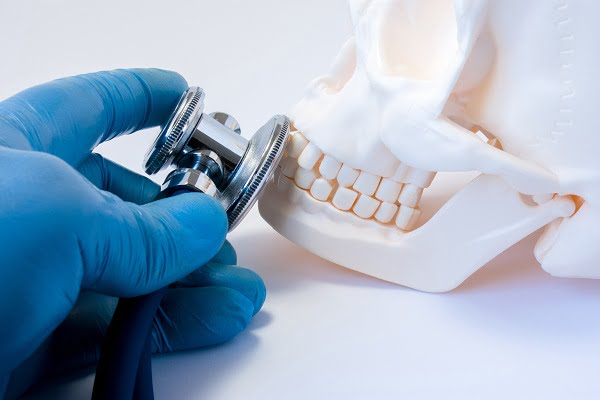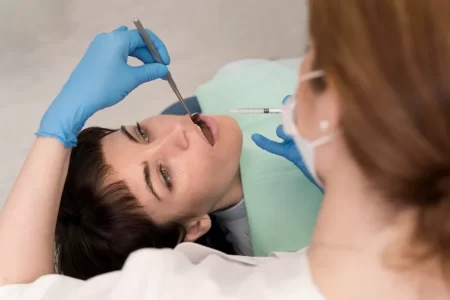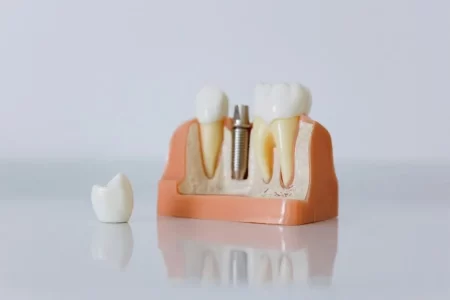Dental Glue, Dental Crown Glue and Dental Cement for Your Teeth
- Updated on: Jul 10, 2024
- 4 min Read
- Published on Sep 27, 2019


What is dental glue? What are dental cements?
Dental glue is basically a slang term used for the dental cement. Dental cements can be described as a group of materials with a wide range of dental & orthodontic applications. Some of its common uses include temporary restoration of teeth, cavity linings to provide pulpal protection, sedation or insulation and cementing fixed prosthodontic appliances (dental crowns, dental bridges, and some removable partial dentures) by a process improperly called cementing or cementation.
Conventional dental cements are presented as separate power & liquid components, to form a viscous liquid by manual mixing, which then sets to form a brittle solid after application on the required treatment surface. These days many advanced cements are available in capsule form which are mixed by mechanical means such as oscillating or rotational mixing machines.
According to the expected longevity of the restoration, dental cements can be divided into 2 groups:
- Provisional (temporary)
- Definitive (permanent)
With the continuous development and advancement of material technology, dental cements have evolved into stronger and more durable materials.
What are the properties of ideal dental cement?
Dental cement should fulfil specific biological, physical, mechanical and handling requirements to establish retention of the restorations to tooth preparation or implant abutment and maintain its integrity.
The properties dental cement should have to qualify for use as ideal dental cement include:
- Good biocompatibility – it should be biocompatible with dental pulp and soft tissues around the teeth.
- Good physical properties – it should have proper film thickness to ensure optimum seating of a restoration, low viscosity, low solubility, extended working time and short setting time, and should be radiopaque.
- Mechanical properties – it should have high tensile/shear/compressive strength, high bonding strength
- Good handling properties – should be easy to mix and clean
- Resistant to dissolution – it should not dissolve in saliva, or in any oral fluid, which can be the primary cause of failure of cements.
More: Loose Tooth Treatment: How Do You Strengthen a Loose Tooth?
More: Tooth Loss (Edentulism): Causes, Prevention, Complications, Treatment
What are the various types of dental cements? What is the composition of various types of dental cements?
Cement which is used for dental purposes can be divided into mainly 5 types and include:
Zinc-Oxide Eugenol (ZOE)
The liquid form of zinc-oxide eugenol is composed of eugenol, water, zinc acetate , ascetic acid, and calcium chloride while the powdered version is composed of zinc oxide, magnesium oxide, and silica.
It is available in two types – the first is used for temporary cementation and is weaker in strength, and the second belongs to the reinforcing agents that make it more effective in permanent cementation.
Zinc Phosphate
Liquid zinc phosphate is composed of aluminum phosphate, phosphoric acid, and water while the powdered version is composed of zinc oxide, magnesium oxide and silica.
It is also available in two types—fine grain and medium grain. The fine grain type is useful in permanent cementation purposes of crowns, inlays, onlays and bridges. The advantage associated with it is that it creates a thin layer which is useful in accurate seatings of dental work. The medium grain type is used for the filling of deep cavities as insulation.
Polycarboxylate
Composition of polycarboxylate includes polyacrylic acid, maleic acid, itaconic acid, tartaric acid, and water, while the powdered form is composed of pure zinc oxide.
Permanent cementation of orthodontic bands and stainless-steel crowns is its main use but it can also be used as a base because it doesn’t cause irritation.
Glass Ionomer
It is available in liquid and powdered form. The former type of glass ionomer is composed of itaconic acid, tartaric acid, maleic acid and water while the latter form is composed of zinc oxide, aluminum oxide and calcium.
There are mainly three types of glass ionomer. Type one is generally used to cement metal restorations and orthodontic brackets, type two is used to restore eroded areas near the gingival and the third type is used to line or bond the dentin.
Composite Resin
Composite resin has variable applications as dental cement. Its characteristic feature is its low film thickness and insolubility in water which enables permanent cementation.
It has wider applications and is used to cement ceramic or resin inlays and onlays, orthodontic bands, ceramic veneers, brackets, and metal castings.
More: Loose Adult Tooth, Loose Tooth Pain in Adults
More: Loose Wisdom Tooth Treatment in Adults: Wisdom Teeth Removal and Extraction
Dental Crown Glue: What kind of dental glue is used for your crowns? Which permanent dental glue for crowns is used by your dentist?
Dental crowns are replacement of missing teeth and are made to fit over your teeth. Crowns are hooked up to abutments, fixed into an implant that is connected to your jaw bone, and held together in their place with the help of dental cements. Dental glue made up of powdered glass and synthetic resins are generally used for crowns.
Glass ionomer (GI), resin-modified glass ionomer (RMGI), Zinc phosphate and resin cements are few dental glues for crowns that create a semi-permanent seal.
Newer dental glue for crowns such as GI and RMGI cement are composed of polyacrylic acid liquid and fluoroaluminosilicate glass powder. Resin cements affect the consistency and strength of the cement due to presence of synthetic resins and dimethacrylates.
Tooth glue for broken teeth
If you have a broken tooth condition, you should immediately consult your dentist for early treatment. Your dentist will fix it by either bonding, placing crown or dental implant depending on your condition.
Some people try to fix broken teeth at home by using over the counter dental cement and superglue. Though the use of dental cement is fine but using superglue to fix your broken teeth can land you with severe complications. They may stick to your skin instantly and may result in gluing of your cheeks or lips.
Another option of short term repair is the use of denture adhesives to glue broken teeth on its place. But you should remember these are temporary measures and a permanent solution can and should only be provided by your dentist.












